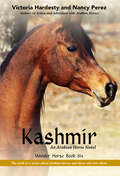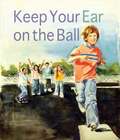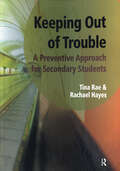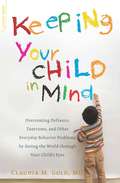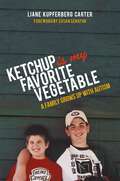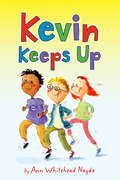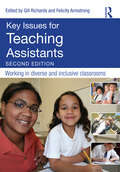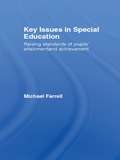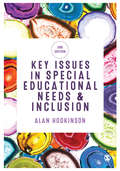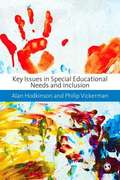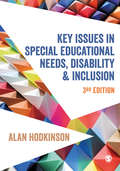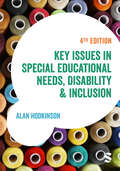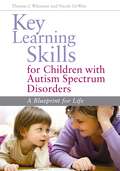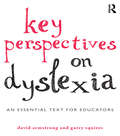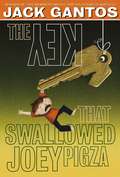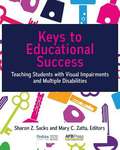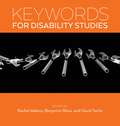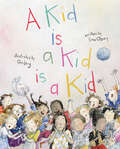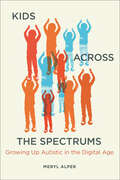- Table View
- List View
Kashmir: An Arabian Horse Novel
by Victoria Hardesty and Nancy PerezKashmir was an abandoned and angry Arabian gelding who had no use for humans. Katie Barclay grew up in the world of Rodeo. She was a driven young lady who planned her life to include specific milestones. When she failed to reach one of them, the failure crushed her and sent her into a deep depression. Kashmir began to remember unique things about himself that his mother taught him as a baby when he recognized some of those same unique qualities in fifteen-year-old Katie. As their connection grew, it healed Kashmir as much as it healed Katie. They became a team. They forged a partnership going against long-held beliefs that Arabian horses had no place in Rodeo. Katie and Kashmir demonstrated the truth in their performances. At the same time, each of them found new ways to use their unusual abilities to help others.
Keep Your Ear on the Ball
by Genevieve PetrilloFrom the book Jacket: Everybody wants to help Davey. "Let me open that." "Do you want to hold my hand?" Davey has one answer for all, "Thanks, but no thanks." Davey is blind-and he is perfectly capable of doing everything on his own. His well-meaning classmates stop offering help when they see how able Davey is. They respect his selfreliance-until he tries to play kickball. After several missed kicks and a trampled first baseman, no one wants Davey on his or her team. But by working together, the children figure out a way to offer help that respects Davey's unique abilities and his desire for freedom. In this seamless tale, based on a true story, the children realize that interdependence can be just as important and rewarding as independence.
Keep Your Head Up, Mr. Putnam
by Peter PutnamThis story, told from Mr. Pudnam himself, tells of the early years of the Seeing eye and how he trained with his first guide dog. Blinded in a gun accident before his eighteenth birthday, this story is of Pudnam grew to accept his blindness, and go and train with his first dog.
Keeping out of Trouble: A Preventive Approach for Secondary Students
by Tina Rae Rachael HayesThe Keeping Out of Trouble programme will enable secondary schools to provide interventions targeted at students who are, or are at risk of, committing criminal offences. By developing the students' awareness of victims, the consequences of their actions and sensitive issues as well as by encouraging students to engage in self-reflection, students will develop the strategies, knowledge and understanding to support themselves in making informed choices about their behaviour and future actions. This essential new resource is based on a programme that was developed by staff in the Youth Offending Team and The Hillingdon Pupil Referral Unit, who recognised that students needed more support. The programme fits in with the Every Child Matters agenda, tackling the 'Be Healthy' 'Stay Safe' 'Enjoy & Achieve' and 'Making a Positive Contribution' aims. The Keeping Out of Trouble programme consists of an initial tutorial session, followed by 16 group sessions and a final self-evaluation and target setting session. These strands of support aim to meet the following objectives: *To enable students to develop consequential thinking *To encourage the development of victim awareness *To develop an understanding of restorative work and ways that they can engage in this kind of work *To enable students to develop an awareness of their own feelings and the ability to label, identify and express these feelings in a safe way *To further develop personal insight, gaining knowledge of strengths and weaknesses and the ability to take structured criticism and feedback *To encourage the development of confidence and self-assurance *To encourage the development of self-reflection skills *To develop an awareness of the consequences of their behaviours - both for themselves and others *To further develop a sense of responsibility and locus of control, that is, to have internal control *To encourage students to further develop and appreciate the perspectives of others, that is, empathy *To encourage students to develop a range of strategies to pre-empt and avoid anti-social and offending behaviours *To encourage facilitators and students to cooperate as joint problem-solvers, engaging in wide ranging discussions around key issues The programme is aimed at: *All young people, especially those who have demonstrated anti-social or criminal behaviour *A group of young people of a similar age *Young people who have not been identified as prolific offenders
Keeping Your Child in Mind: Overcoming Defiance, Tantrums, and Other Everyday Behavior Problems by Seeing the World through Your (A Merloyd Lawrence Book)
by Claudia GoldBeing understood by someone you love is one of the most powerful feelings, at all ages. For a young child, it is the most important of all experiences because it allows the child’s mind and sense of self to grow. In the midst of the perennial concerns parents bring to Dr. Claudia Gold, she shows the magical effect of seeing a problem from their child’s point of view. Most parenting books teach parents what to do to solve behavior problems, but Dr. Gold shows parents how to be with a child. Crises are defused when children feel truly heard and validated; this is how they learn to understand, and, eventually, control themselves. Dr. Gold’s insightful guide uses new research in developmental psychology and vivid stories from her practice to show parents how to keep a child in mind and deepen this central relationship in their lives.
Kenneth Jernigan: The Master, The Mission, The Movement
by Kenneth JerniganCompiled writings of Dr. Kenneth Jernigan with editorial introduction and notes
Ketchup is My Favorite Vegetable: A Family Grows Up with Autism
by Susan Senator Liane Kupferberg CarterHow do you create an ordinary family life, while dealing with the extraordinary needs of an autistic child? Meet Mickey - charming, funny, compassionate, and autistic. In this unflinching portrait of family life, Liane Kupferberg Carter gives us a mother's insight into what really goes on in the two decades after diagnosis. From the double-blow of a subsequent epilepsy diagnosis, to bullying and Bar Mitzvahs, Mickey's struggles and triumphs along the road to adulthood are honestly detailed to show how one family learned to grow and thrive with autism.
Kevin Keeps Up
by Ann Whitehead Nagda Chris RussoOh no! Beezer the Buzzard will be the sub while Mrs. Steele is away, and Kevin is going to be dead meat! When Mrs. Steele goes on an extended trip to Africa, Kevin knows he'll be stuck inside for every recess and have his desk moved to the front of the class. Mrs. Beezer just doesn't understand Kevin's problems with focusing and controlling his impulses. This charming chapter book takes a perceptive look at ADHD and the challenges it can present in school.
Key Concepts in Learning Disabilities (SAGE Key Concepts series)
by Tom Mason Geoff Astbury Pat Talbot"A helpful resource for those undertaking studies in learning disabilities at all levels. I shall definitely be recommending it to my students!" - John Boarder, Bangor University "This book provides a valuable and innovative contribution to the field of Learning Disabilities." - Logan Parumal, University of Manchester Key Concepts in Learning Disabilities is a handy guide to the topics you need to know about whether studying or working in the field of Learning Disabilities. The A-Z format allows you to "dip in" and quickly find relevant information on topics ranging from Autism to Rights and from Advocacy to Challenging Behaviours. Each entry features: - a snapshot definition of the concept; - a broader discussion of the main issues and applications to practice; - key points; - a case study, and - signposts to further reading. Key Concepts in Learning Disabilities is an ideal companion to study and particularly useful for those completing academic assignments as part of training. Written by a team of experienced practitioners and lecturers, the book reflects the multi-disciplinary nature of contemporary practice.
Key Issues for Teaching Assistants: Working in diverse and inclusive classrooms
by Felicity Armstrong Gill RichardsThis book is designed to support Teaching Assistants in the important and unique role they play in the education of children. This new edition includes a range of additional material and reflects developments in the recent UK context and legislation that relates to participation and diversity. It raises issues concerning values and professional practice for Teaching Assistants, emphasising inclusive approaches and the importance of understanding the perspectives of learners throughout. Each chapter contains an overview of topical debates, current research, a discussion of issues relating to values and professional practice. Every chapter raises questions and suggests reading for further reflection. This highly accessible resource includes contributions from leading researchers and experienced education practitioners. It introduces a range of issues, with a focus on inclusion and the key role of teaching assistants, such as: understanding inclusive education: school communities and participation Special educational needs and inclusive practice supporting Gypsy, Roma and Traveller (GRT) children ethnic diversity and attainment the influence of gender on the achievement of boys and girls working with teachers and parents religious diversity and inclusive practice including and supporting Lesbian, Gay, Bi-sexual, Transsexual (LGBT) students welcoming and understanding asylum seeking and refugee students disability, human rights and inclusion. This book will enable Teaching Assistants to develop a deeper understanding of the fundamental principles of inclusive education. It provides an essential resource for Teaching Assistants and all those working in Education.
Key Issues In Special Education: Raising Standards Of Pupils' Attainment And Achievement
by Michael FarrellConsiderable challenges can face all those involved in teaching children with special educational needs. Complex policy and legislation, bureaucracy, inspection and limited resources can all appear difficult obstacles to those seeking to provide effective tuition. In this highly practical book, Michael Farrell unpicks and clarifies the role of educational standards in today's schools. Drawing extensively on detailed, real-life case studies, he closely explores such issues as: the definition of standards, identifying and providing for special educational needs, assessment and benchmarking, curriculum provision and target-setting, the role of the Code of Practice. Special educational needs coordinators, senior managers in schools and students completing initial training courses will find this an invaluable resource, which effortlessly simplifies an often complicated process.
Key Issues in Special Educational Needs and Inclusion (Education Studies: Key Issues)
by Alan HodkinsonUnderstanding and engaging critically with the field of special educational needs and disability (SEND) is a difficult task. However, the new edition of this bestselling book continues to help students contextualize SEND in relation to historical, ideological and political developments as well as support them in developing a critical understanding of the complexities associated with inclusion. Completely up to date with recent legislation such as the SEND Code of Practice (2014) there are case studies, reflections and activities which will help students question practice they have seen and experienced. Covering the 0-25 age range this book is suitable for all those working with children and young people across education, health and social work.
Key Issues in Special Educational Needs and Inclusion (Education Studies: Key Issues)
by Alan HodkinsonUnderstanding and engaging critically with the field of special educational needs and disability (SEND) is a difficult task. However, the new edition of this bestselling book continues to help students contextualize SEND in relation to historical, ideological and political developments as well as support them in developing a critical understanding of the complexities associated with inclusion. Completely up to date with recent legislation such as the SEND Code of Practice (2014) there are case studies, reflections and activities which will help students question practice they have seen and experienced. Covering the 0-25 age range this book is suitable for all those working with children and young people across education, health and social work.
Key Issues in Special Educational Needs and Inclusion
by Alan Hodkinson Philip Vickerman'This is probably one of the most accessible books I have read lately in relation to SEN and Inclusion, and I intend to make it an essential core text for my inclusion module. It would be very accessible to students who are relatively new to the theoretical aspects behind the idea or concept of inclusion' - ESCalate Complex and diverse, special educational needs and inclusion can be a difficult area of study to approach for undergraduate students. Understanding the current context of SEN and inclusion means getting to grips with an often perplexing mix of social, political, ideological, educational and personal perspectives. This book explores and critically examines the field, providing a detailed introduction to the topic for students - helping them to develop understanding, without assuming any prior knowledge. Section one defines the concepts of SEN and disability and how the concepts have been defined through ideological models that have developed over time. It examines provision for SEN across the UK, and looks at how attitudes of teachers, parents and children have affected inclusion. Section two explores the historical development of SEN internationally, including a comparative look at legislation and practice in England and a number of other countries. Section three details how SEN practice in England works, including the Every Child Matters agenda and the roles and responsibilities of education, health and social care professionals. Each chapter includes short case studies, points for reflection, student activities and suggestions for further reading. Alan Hodkinson is principal lecturer in education research at Liverpool John Moores University, where Philip Vickerman is Professor of Inclusive Education and Learning, and Head of Research for Physical Education, Sport, Dance and Outdoor Education.
Key Issues in Special Educational Needs, Disability and Inclusion (Education Studies: Key Issues)
by Alan HodkinsonThis third edition continues to guide students through the challenging field of special educational needs and disability. Contextualising SEND in relation to historical, ideological and political developments, this book offers essential support to students as they develop a critical and up-to-date understanding of the practical challenges and opportunities concerning inclusion. New edition features include: • Up-to-date legislation, such as the SEND Code of Practice • Material surrounding social, emotional and mental Heath • New practical case studies, reflections and activities • Revised chapter summaries • More on the future of SEND
Key Issues in Special Educational Needs, Disability and Inclusion (Education Studies: Key Issues)
by Alan HodkinsonThis third edition continues to guide students through the challenging field of special educational needs and disability. Contextualising SEND in relation to historical, ideological and political developments, this book offers essential support to students as they develop a critical and up-to-date understanding of the practical challenges and opportunities concerning inclusion. New edition features include: • Up-to-date legislation, such as the SEND Code of Practice • Material surrounding social, emotional and mental Heath • New practical case studies, reflections and activities • Revised chapter summaries • More on the future of SEND
Key Issues in Special Educational Needs, Disability and Inclusion (Education Studies: Key Issues)
by Alan HodkinsonThis fourth edition has been revised throughout to continue to support students in their learning of special educational needs and disability. This essential book provides students with a critical and up-to-date view of the sector through key issues and debates to deepen understanding around inclusion. New to this edition: - Revised further reading with videos and podcasts to support learning and research - Links to the new Green Paper, latest Code of Practice and legislation - Extensive updates and revisions to all chapters - New case studies, reader reflections, taking it further and student activities. Alan Hodkinson, Professor in the Centre for Cultural and Disability Studies at Liverpool Hope University.
Key Issues in Special Educational Needs, Disability and Inclusion (Education Studies: Key Issues)
by Alan HodkinsonThis fourth edition has been revised throughout to continue to support students in their learning of special educational needs and disability. This essential book provides students with a critical and up-to-date view of the sector through key issues and debates to deepen understanding around inclusion. New to this edition: - Revised further reading with videos and podcasts to support learning and research - Links to the new Green Paper, latest Code of Practice and legislation - Extensive updates and revisions to all chapters - New case studies, reader reflections, taking it further and student activities. Alan Hodkinson, Professor in the Centre for Cultural and Disability Studies at Liverpool Hope University.
Key Learning Skills for Children with Autism Spectrum Disorders
by Nicole Dewitt Thomas L. Whitmanxx
Key Perspectives on Dyslexia: An essential text for educators
by David Armstrong Garry SquiresThis indispensable book critically sets out the skills and knowledge required by a specialist educator for students who present with dyslexia. The British Dyslexia Association Professional Criteria (BDA, 2012) provides an anchor throughout for this book’s content. Chapters are explicitly mapped to specific professional criteria, offering the reader confidence that guidance in Key Perspectives on Dyslexia is underpinned by this internationally recognised professional framework.?? Key issues in the education and care of those affected by dyslexia are critically explained and explored in this publication, using both author’s years of specialist experience in this field. As established scholars both authors also suggest how research can inform and enrich how an educator responds to these issues.?? The content of this book includes: Detailed case studies disclosing how dyslexia presents in different individuals and which richly illuminate the issues considered by each chapter A concise examination of reading instruction in the context of typically-developing students and in relation to those who present with dyslexia: this incorporates an expert but accessible review of international policy and educational practice, including influential findings from research Detailed guidance on how to identify possible dyslexia and key issues to consider in referral and assessment of those affected, including associated models here such as Response to Intervention (RTI)? Consideration of intelligence and in how this figures in relation to assessment for dyslexia, including the possible role of intellectual disability (ID). Comprehensive evaluation of the role of behaviour in relation to dyslexia, with guidance on how this can be used to inform a programme of support for students with social, emotional or behavioural difficulties (EBD/SEBD). Consideration of how the professional role of a specialist educator might travel across the English speaking world and also beyond in China or India.?? Key Perspectives on Dyslexia is an essential text for educators and will become a landmark guide for educational practice and policy.???
The Key That Swallowed Joey Pigza (Joey Pigza Series #5)
by Jack GantosThe fifth and final book in the groundbreaking Joey Pigza series brings the beloved chronicle of this wired, wacky, and wonderful boy to a crescendo of chaos and craziness, as everything goes topsy-turvy for Joey just as he starts to get his feet on the ground. With his dad MIA in the wake of appearance-altering plastic surgery, Joey must give up school to look after his new baby brother and fill in for his mom, who hospitalizes herself to deal with a bad case of postpartum blues. As his challenges mount, Joey discovers a key that could unlock the secrets to his father's whereabouts, a mystery that must be solved before Joey can even hope that his broken family might somehow come back together―if only it doesn't pull him apart first.
Keys to Educational Success
by Sharon Z. Sacks Mary C. Zatta EditorsEvery student has unique learning needs, but addressing the diverse needs of students who have visual impairments and multiple disabilities can be particularly challenging for teachers. Keys to Educational Success helps educators unlock the learning potential of their students by providing key program strategies that can be directly applied to classroom learning routines. It includes information about the basics of assessment, IEP development, and instructional planning and design, as well as specific strategies for essential areas of instruction including communication, literacy, O&M, behavior intervention, technology, and others. Guidelines for working with very young children, as well as for preparing students for life transitions after school, are explained. Keys to Educational Success is also an important reference for special education teachers, educational team members, and administrators.
Keywords for Disability Studies (Keywords #7)
by Rachel Adams Benjamin Reiss David SerlinIntroduces key terms, concepts, debates, and histories for Disability StudiesKeywords for Disability Studies aims to broaden and define the conceptual framework of disability studies for readers and practitioners in the field and beyond. The volume engages some of the most pressing debates of our time, such as prenatal testing, euthanasia, accessibility in public transportation and the workplace, post-traumatic stress, and questions about the beginning and end of life.Each of the 60 essays in Keywords for Disability Studies focuses on a distinct critical concept, including “ethics,” “medicalization,” “performance,” “reproduction,” “identity,” and “stigma,” among others. Although the essays recognize that “disability” is often used as an umbrella term, the contributors to the volume avoid treating individual disabilities as keywords, and instead interrogate concepts that encompass different components of the social and bodily experience of disability. The essays approach disability as an embodied condition, a mutable historical phenomenon, and a social, political, and cultural identity.An invaluable resource for students and scholars alike, Keywords for Disability Studies brings the debates that have often remained internal to disability studies into a wider field of critical discourse, providing opportunities for fresh theoretical considerations of the field’s core presuppositions through a variety of disciplinary perspectives.Visit keywords.nyupress.org for online essays, teaching resources, and more.
A Kid Is a Kid Is a Kid
by Sara O'LearyIn this companion to the enormously popular A Family Is a Family Is a Family, a group of kids share the silly questions they always hear, as well as the questions they would rather be asked about themselves. Being the new kid is hard, a child in the school playground tells us. I can think of better things to ask than if I’m a boy or a girl. Another child comes along and says she gets asked why she always has her nose in a book. Someone else gets asked where they come from. One after another, children share the questions they’re tired of being asked again and again — as opposed to what they believe are the most important or interesting things about themselves. As they move around the playground, picking up new friends along the way, there is a feeling of understanding and acceptance among them. And in the end, the new kid comes up with the question they would definitely all like to hear: “Hey kid, want to play?” Sara O’Leary’s thoughtful text and Qin Leng’s expressive illustrations tell a story about children who are all different, all themselves, all just kids. Key Text Features dialogue Correlates to the Common Core State Standards in English Language Arts: CCSS.ELA-LITERACY.RL.1.6 Identify who is telling the story at various points in a text. CCSS.ELA-LITERACY.RL.1.7 Use illustrations and details in a story to describe its characters, setting, or events. CCSS.ELA-LITERACY.RL.2.1 Ask and answer such questions as who, what, where, when, why, and how to demonstrate understanding of key details in a text. CCSS.ELA-LITERACY.RL.2.6 Acknowledge differences in the points of view of characters, including by speaking in a different voice for each character when reading dialogue aloud. CCSS.ELA-LITERACY.RL.2.7 Use information gained from the illustrations and words in a print or digital text to demonstrate understanding of its characters, setting, or plot. CCSS.ELA-LITERACY.RL.3.1 Ask and answer questions to demonstrate understanding of a text, referring explicitly to the text as the basis for the answers. CCSS.ELA-LITERACY.RL.3.7 Explain how specific aspects of a text's illustrations contribute to what is conveyed by the words in a story (e.g., create mood, emphasize aspects of a character or setting)
Kids Across the Spectrums: Growing Up Autistic in the Digital Age
by Meryl AlperAn ethnographic study of diverse children on the autism spectrum and the role of media and technology in their everyday lives.In spite of widespread assumptions that young people on the autism spectrum have a &“natural&” attraction to technology—a premise that leads to significant speculation about how media helps or harms them—relatively little research actually exists about their everyday tech use. In Kids Across the Spectrums, Meryl Alper fills this gap with the first book-length ethnography of the digital lives of autistic young people. Based on research with more than sixty neurodivergent children from an array of racial, ethnic, and socioeconomic backgrounds, Kids Across the Spectrums delves into three overlapping areas of their media usage: cultural belonging, social relationships, and physical embodiment. Alper&’s work demonstrates that what autistic youth do with technology is not radically different from their non-autistic peers. However, significant social and health inequalities—including limited recreational programs, unsafe neighborhoods, and challenges obtaining appropriate therapeutic services—spill over into their media habits. With an emphasis on what autistic children bring to media as opposed to what they supposedly lack socially, Alper argues that their relationships do not exist outside of how communication technologies affect sociality, nor beyond the boundaries of stigmatization and society writ large. Finally, she offers practical suggestions for the education, healthcare, and technology sectors to promote equity, inclusion, access, and justice for autistic kids at home, at school, and in their communities.
